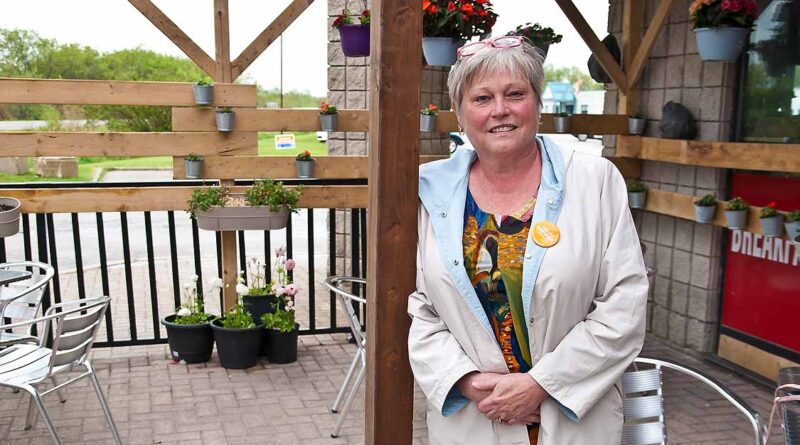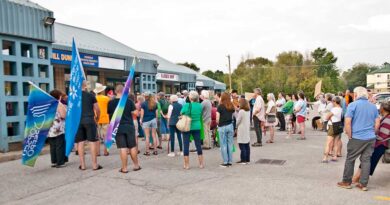Elizabeth Van Houtte, Not Running On Empty
By John Swartz
SUNonline/Orillia profiles candidates from each party in the forthcoming provincial election. Each candidate was asked the same set of questions. All candidates were invited to participate, however Mark Douris of the New Blue Party and Jill Dunlop of the Progressive Conservative Party of Ontario did not make arrangements to meet with SUNonline/Orillia.
By John Swartz
Elizabeth Van Houtte is originally from Norfolk County, a daughter of immigrant farmers. Her first job after college was with Brant County social services. Later while working for the Canadian Mental Health Association in Brantford she attained a degree in community mental health, and then a certificate in psychiatric rehabilitation from Humber College.
Van Houtte met her future husband at a conference in New York City, got married and moved to New Jersey and became a social worker working neighbourhoods in one of the most crime ridden American cities, Camden.
“That’s correct and immigration told that’s where I had to work because I went in on a social work visa until we got married,” Van Houtte said.
“I loved the people. My clients were the best. I had colleagues who wouldn’t go to the projects I was working in. They went, ‘I’m not going there,’ and I going, ‘send me.’ I never felt my life was threatened, but there was always that edge.”
Back to school, she got two masters degrees in vocational rehabilitation and psychiatric rehabilitation at Rutgers. When you’ve gone that far, might as well go for the PhD., which she did at Widener University in suburban Philadelphia.
“That’s when I became very involved and interested with politics and policy because it’s about what’s the state going to fund, but how can we deal with this issue?” said Van Houtte.
She lost her job because of cuts to state funding and her husband was due to retire, so she came back to Canada, husband in tow. The landing place was in Orillia where she took a teaching job with Lakehead University.
“It was perfect timing to move. I didn’t grow up here but this is where the job was,” said Van Houtte. “We loved it here and I wasn’t leaving. My kids (twin daughters) love it here, Dennis loves it here, great place to raise a family.”
Van Houtte became familiar with tele-work long before the pandemic heading teams of rehab physical occupational therapists and counselling clients across Ontario.
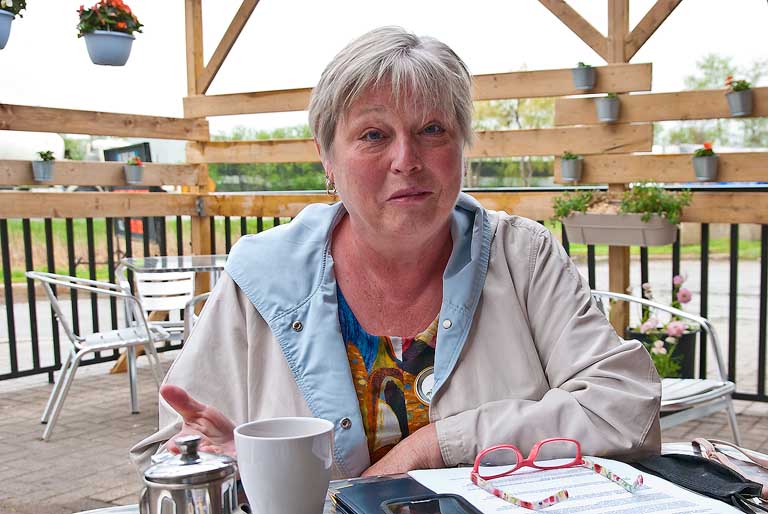
“Since the last election, I’m in private practice. I haven’t been in my office since March 2020 and I actually gave up my office space and do it all online through Zoom. It’s busier than it’s ever been. The impact of COVID on people,” has been bad Van Houtte said. Her clients now are people working in health and emergency services and teachers.
“What COVID did was people were working longer, people were working harder and they were dealing with the impact of COVID on society; many more mental health calls (they responded to), but then ‘mom’s in the nursing home and I can’t see her,’ and then other wave starts to come in and ‘my wife has to take a leave from her job because she’s got to homeschool the kids and our house is chaotic.’”
“It was the on and off of, ‘what do I do next?’”
On top of that we’re living through a war and fear of American style politics growing in Canada. Van Houtte is a veteran campaigner, having run for Orillia council, and previous federal and provincial elections.
“This campaign is like no other for a number of reasons. I have a bigger team than I’ve ever had. NDP supporters have always supported me, but now they are coming out. They’re saying, ‘put me on the ground, put me on the phones.‘”
“At the door is most astonishing. We go in thinking, OK we’ll probably get some Liberal votes, we might get some Green votes because the Green Party is not doing well. At the door – ‘always voted PC, my family’s always voted PC, I am not voting PC.’ (It’s) older white men, who typically would not be somebody who we would attract.”
“Why? the license plate rebate Is one of the common reasons given.”
The NDP prepared for months for this campaign. Van Houtte was named the Simcoe North candidate last fall and was the first out of the gate with a detailed platform.
“Our platform has been available for some time. The Liberals are a little bit behind the game on that and in fact the Liberals haven’t submitted a costed budget yet,” said Van Houtte. The NDP had just detailed of how much the programs they are running on will cost taxpayers when Van Houtte spoke with SUNonline/Orillia.
“Are we going to run at a deficit? Of course we are. We’re already in a deficit. Ontario has a revenue problem and that wasn’t because of us. They’re telling us we’re going to spend, spend, spend; that’s our nickname apparently, and we already have a revenue problem and our infrastructure is deteriorating around us.
Then you get the most well off, what we’re proposing is anyone who makes under $200,000 a year you’re Ontario tax rate is frozen for the entire term we are in power. Anybody who makes $200,000 a year will be indexed up. Right now business, corporations, people in the six to seven hundred thousand range pay 13.3% provincial tax. We will raise that to 15%. It’s a small percentage rate and it will bring back enough money to rebuild our healthcare and education system. We want people to pay their fair share. Ontario’s taxation rate for the wealthy is the lowest in the country.”
“The NDP, when they’ve been in power have balanced the budget. They’re the only party who has balanced (every) budget. Yes, we spend, but we spend where it matters, on the people. It gets into that, ‘oh, them.’ That divisiveness, that’s an American approach, I lived it, I saw it, I breathed it,”
Healthcare
Each Candidate was specifically asked – does privatization make healthcare better? as a starting point.
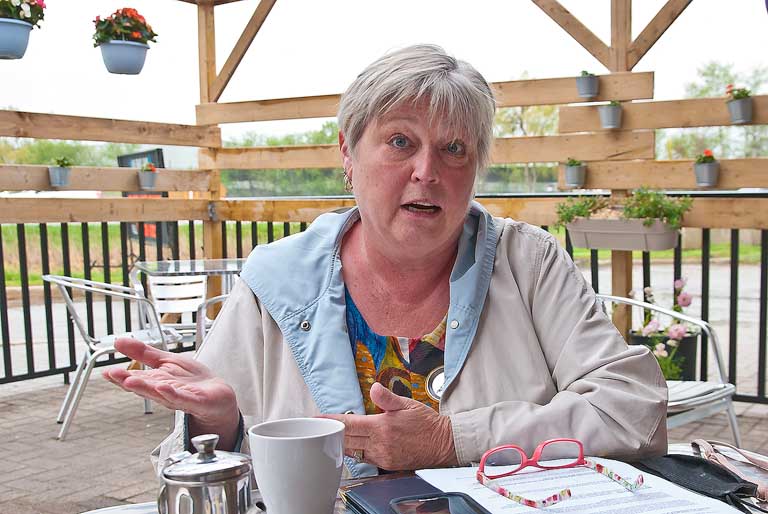
“I do not support privatization of healthcare in any way, shape or form. What privatization does, it creates a two-tier system and I wrote a letter on this to the editor when Christine Elliott let it out of the bag they were going to open private clinics to deal with the backlogs of surgery because of COVID.”
“What privatization does, and I saw this in the U.S., either you pay out of your pocket, so if you want that hip replacement and you need it now because right now you’ve got to wait, you can pay the $30,000. For the ultra wealthy, that’s nothing for them, they can write that off on their taxes. For the middle and lower income families, we can’t afford to pay for our health care. The leading cause in the U.S. of bankruptcy is healthcare debt. The privatization they are speaking of is they will clearly take money and then if they have room left over they’ll take the other people, so you’re still last in line. Private company’s healthcare charges through insurance companies are 25% greater than a public healthcare system.”
“I lived that system in the U.S. Our (Canadian) healthcare system was the apple of the world’s eye 30 years ago. When I was growing up I remember being so proud of our healthcare system and thinking everyone is watching us. Tommy Douglas, our founder worked with other parties to make it happen and in the last 30 years we have seen wait lists, people in the ER for hours on end, a shortage of doctors a shortage of nurse,” said Van Houtte
Healthcare has a mounting staff crisis across all of the front line. People are burnt out, overworked and underpaid. Van Houtte has a food analogy to describe what has been happening in healthcare with successive budget cuts and wage limiting legislation like Bill 124.
“You know a gyro that’s on a stick, the ground lamb, they keep shaving it and shaving it until there’s nothing left on the stick, that’s 30 years, and then the worst case scenario, we have a pandemic,” said Van Houtte.
“I had a meeting this morning with Carmine Stumpo (Soldiers’ CEO), so it’s the perfect time to meet with you because he had three major points he wanted to get across. He talked about rehabilitation. They got more beds during COVID, the hospital is inadequate so the whole rehab facility went to the wayside. Their community support program, which they have nurses come out, he said we’re at a crisis with staffing.”
The province forced municipalities to create emergency plans involving all agencies, the one thing they didn’t include was a pandemic. We have experience now, but better planning needs to be done in several areas.
“We are committed to ensuring Ontarians are safe no matter what happens. We don’t have all the answers, but there are people who do. Obama did that. He went to all the people and said, ‘what do we need to do?’ and put it all together. We can do that in this province. Look what happened to the health units, I feel for Charles Gardiner (SMDHU Medical Officer of Health), he’s following the Science Table and then the premier is saying something different and now Gardiner is the bad guy because he’s saying what he thinks needs to happen and schools should not happen and then he (premier) announces opening of school and we’re back into wave 2 and wave 3.”
Regarding plans to build a new hospital. Many community leaders do not want to see the province decide the place to build one is west of Highway 11. Doing so would leave a gaping hole in the heart of the City and undo decades of planning and remodeling the downtown core to last well into the future. Will Van Houtte stand up and make sure the right decision is made?
“I would support that 100%. Remember we are servicing people on the other side (of the lake) as well. Something of that nature, that important a piece in our community is a community decision, it’s not a ministry decision. The ministry is there to listen to the community. Carmine said today, ‘we have so many partners in this community from all different levels that collectively we can come up with something together,’” said Van Houtte.
“Orillia does need a new hospital. The infrastructure isn’t there and the demand is too high and the census just came out saying Orillia is off the chart in terms of growth and density as opposed to the infrastructure of our healthcare system.”
There are MPs who constantly introduce private member’s bills on Parliament Hill to ban or restrict abortion. There have been 47 such bills since the Supreme Court struck down Canada’s abortion law in 1988 – with one defeated just last year. The law is federal, but the funding is provincial and that is the tool MPPs here and in other provinces have targeted. During this election several candidates have spoken publicly about legislation, so this issue is forced to be on our radar once again. Where does Van Houtte stand on the legality and access.
“No, absolutely not. No restrictions. That’s’ a personal decision between the mom, the partner and the physician and that is no place for religious doctrine.”
Housing
With this series of candidate profiles, Van Houtte was also asked the same starter question – why should corporations be allowed to own so much of rental stock (30% in many larger cities) and control prices?
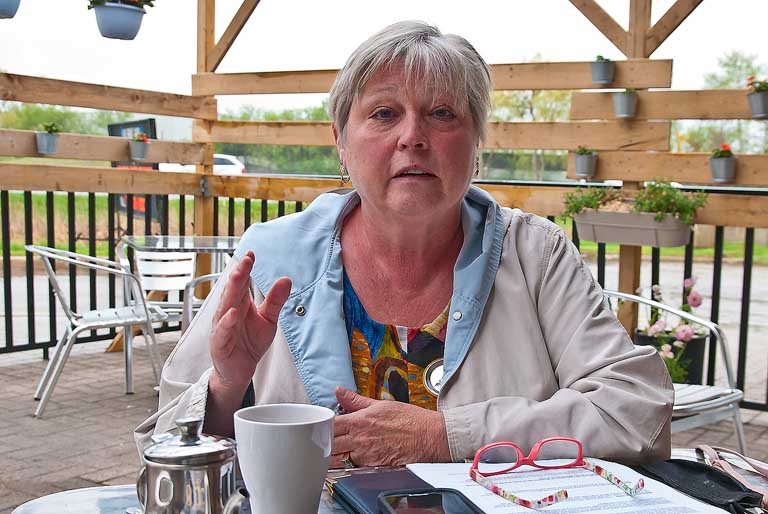
“First of all we’re going to regulate short term rentals so it doesn’t drive up market prices, with no loopholes; increase the non-resident speculation tax to 20%, which it’s not at now, and expand it to the whole province and close the loopholes; introduce a speculation and vacancy tax for those who do not pay taxes in Ontario and own houses they don’t live in. They’ll redirect the corporate goal to provide supply to the market instead of manipulating market for short term gain. The other one is stopping renovictions; kick them out and they put in a new faucet and charge $500 more a month rent.”
A big factor driving high rents and high homeownership prices are real estate investment corporations bring buckets of money to sales meetings and driving out individual buyers from the market. This also results in control of rental prices too. Decades of regulation erosion and changing finance law lead to the current situation, can this thing be brought under control?
“It needs to be regulated, no doubt about it. We have a really good plan for affordable housing. Our plan is to help first time home buyers. The CMHC has a grant program, topping up that grant program for the down payment of the house and you have it interest free and you don’t pay it back unless you sell your home.”
“It’s an unfair system on so many levels. We’re being squeezed out. What I’m hearing at the door? Housing, that and affordability.”
Work and Social Assistance
Again, a starter question kicked off discussion with each candidate – why is it OK for some Ontarians to live below the poverty line?
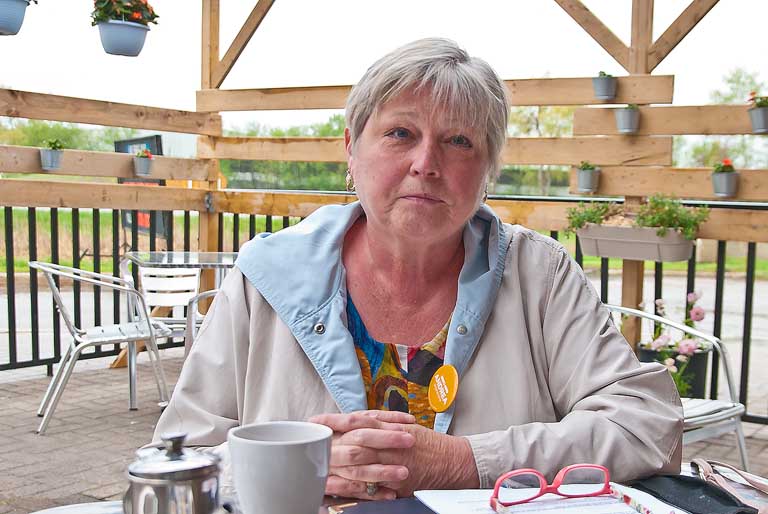
“It’s not OK. Think of the social detriments of health. When you have no money you’re physical health is affected. Because you have a disability, because you are not able to be productive, as we created this image in society, this demand if you are not productive you don’t matter. What we’ve done is said, ‘take this little bit and you go have a good life.’ They can’t afford to eat. We have a strong platform; 20% increase immediately to OW and ODSP recipients upon our election, in year two that will be doubled. That 20% is what they should have gotten in the last 4 years. In year two that will lift people out of poverty, but it’s still going to be short of what we call a living wage, which is Universal Basic Income. By the end of our term people will be at a level playing field with a living wage regardless of if you are disabled or not,” said Van Houtte.
Ontario did have a UBI pilot project, which, while not entirely universal, did provide many poor people with the kind of financial support many economic experts focusing on labour trends have been advocating. It was short-lived, meaning an election happened.
“Look at the pilot projects that were going on when Ford got elected in 2018, the UBI projects that were actually proven to be effective – they were being researched by universities, analyzing it – (he) got rid of it right away. So you just knocked people back into poverty again, yet wouldn’t raise minimum wage, you wouldn’t do anything to lift people up.”
Far too many people in and out of politics have only known the ideal having a job means you’re somebody and if you have no job getting a job will fix everything. It’s not true now when even the McJobs are automating and change is snowballing. We are now in a continuously contracting job market – despite the blip in vacancies resulting from the pandemic (many people walking away from jobs are starting their own businesses and refusing to work under the conditions pre-pandemic).
“One of my colleagues at another university did a research project attacking that myth people are lazy and don’t want to work. What he found out, that wasn’t the case. People did want to work, but they weren’t trained, they weren’t educated and they had disabilities and that’s where the missing gap is.”
“We’re calling it a living wage at this point, but we will bring back the UBI system, those pilot projects we knew were working. I think over our term of four years you’re going to see them up and running for sure,” said Van Houtte.
Public Discourse
Many Canadians are not willing to see or admit we have a far right extremist problem. It’s what has been fueling online misinformation and many violent acts. Yet the torn families and friendships pile up because of the efforts of a few to disrupt society, aided by Russian propaganda campaigns. Even now, despite the evidence the Ottawa Truck Convoy was organized and lead by people with other motives, our collective heads are in the sand.
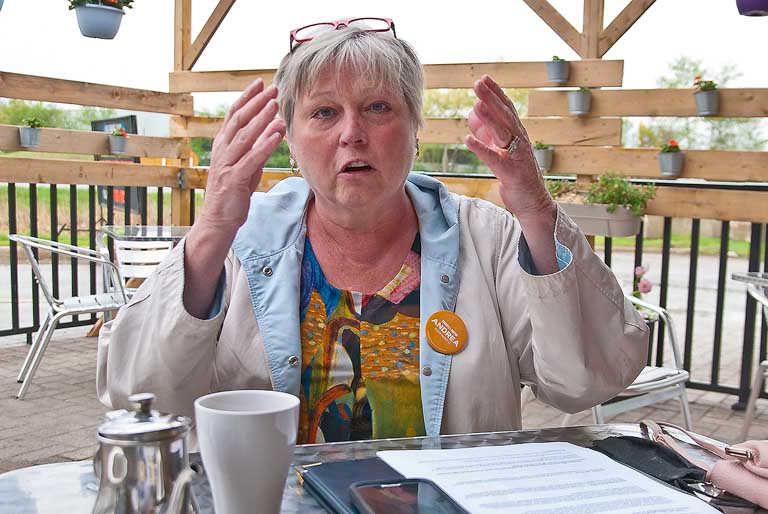
“They got duped,” Van Houtte said of Canadians who genuinely thought the protest was about pandemic mandates. “They went there thinking it was for one thing and bought into that one thing without understanding the real seriousness of what this group is about.”
The protest was born and blossomed online. The federal government has attempted, and is attempting, to legislate some kind of regulation of the internet, thoughtfully trying to target hate speech, but going about it the wrong way according to those who know how messages spread on the internet. Van Houtte thinks restoring faith in government is an effective start.
“There is no room for hate speech. It will not be tolerated by this government when we get elected. How are we going to make that happen? Well, populism and extremism are what we are dealing with. They’re fueled by a loss of faith in government. This has been escalated by COVID.”
“They were looking at countries that had the best outcomes during COVID. They predicted countries that were not going to do well, India, China, African countries; they didn’t have the infrastructure, they didn’t have the medical staff or money to buy vaccines. They came back and had pretty much predicted every single country except one. In the top 5 best response to COVID, and they were expected to go down to in flames, Vietnam. Because they had leadership during the entire pandemic, they were given direction, they abided, they trusted their government and said, ‘we’ve got to get through this together.’ They had a strong leader saying, ‘this is what we need to do,’ and they abided. The extremists would probably call them sheep, but they dealt with a pandemic in the most effective way.”
Highways Or Public Transit?
What if they built a new highway parallel to an existing, underused, expensive to use highway? Would you say something is wrong with that thinking? What if three more major highway projects are in motion with the stated intent of relieving congestion and reducing travel time? Would you say there is something wrong with that thinking if you new every highway expert says new highways in metro areas do not accomplish those goals.
And what if these new highways were going to pave over prime farmland which will become increasingly vital as each year passes and climate change gains strength? Would you consider that forward thinking?
Wouldn’t it make more sense to put those billions of dollars into improving public transit, especially intercity public transit?
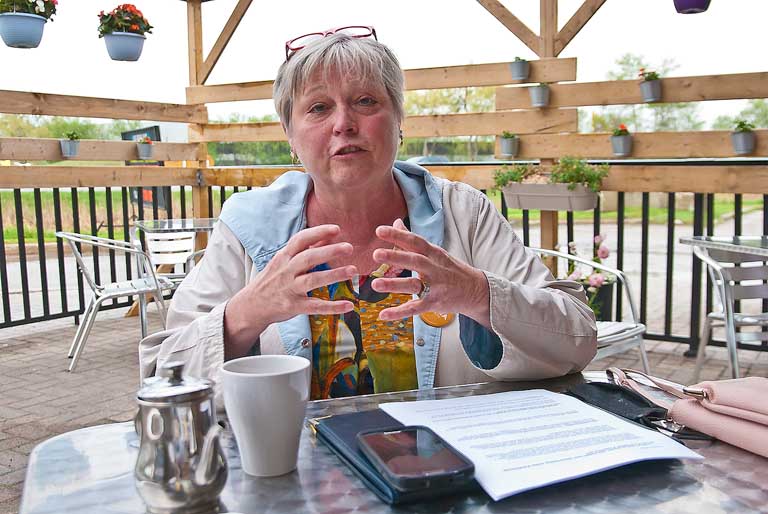
“Let’s use the Bradford Bypass because it’s closest, and the cost, $6 billion I believe. It’s a ridiculous amount of money. The studies are not proving. They’re (government) saying it will cut 13 minutes off and the experts are saying maybe 15 seconds, the complete opposite.”
“Why highways? It’s big development. The developers are in the pocket of Mr. Ford and it has been proven all that farmland, the Holland Marsh, the wetlands in that area; farmers are leaving, their kids don’t want to take it, they’re selling it off and that land is already owned by those developers. The Toronto Star listed every single one of them and they own a piece of that entire highway. They’re holding on it and that’s where they’ll get their money because the province will pay them to buy the land to build the highway.”
“Communities need to be connected and Linx is a really good example of how you can make that happen. Bring the Go Train up here. The pandemic changed everything because people could work from home. We realized people didn’t have to spend two hour to get to the city to get to their job.”
“And you’ll find it will be cheaper than that highway. It only benefits a certain few. The things we (NDP) pass, the things we are promoting and are committed to are not just for a certain few. It will benefit as many people as we can. If you’re talking transit up here, getting it to Washago, getting it to North Bay.”
It’s not just about new rail lines and bus routes. It’s more busses and train cars, more frequency – and connecting hassle free to the next system you need to take on your journey. In short, reliability, frequency and going where one needs to go.
Van Houtte recounted her experience with European public transit recently. Great connectivity from country to country, less waiting than at an airport, choices of when and where to travel, and it didn’t bankrupt her. Then she contrasted her experience trying to sort out public transit to get to a meeting in the GTA.
“Taking public transit as it is now turned out to be a convoluted exercise because of all the different systems not lining up seamless compared to Europe. I figured it was probably going to be about three and half hours and – ‘I’m not going, I’m not doing this.’ It’s too stressful because I don’t know the transit system. I decided to drive, I felt bad about it. After a day of researching we gave up.”
The Last Word
Van Houtte starts with two subjects she’s familiar with by vocation that need fixative attention, and then segues to how the slide in those areas has played out in society as she has observed.
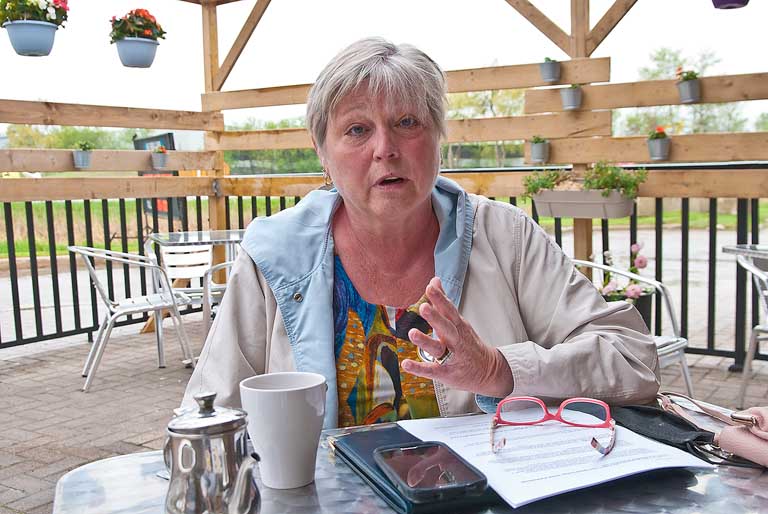
“Mental healthcare is important to me. I like that people are now talking about it when they didn’t before. We’ve seen this whole shift because of the pandemic, the stigma has been releasing itself.”
“Good education for our kids. The kids suffered tremendously. My kids hated online learning, so getting rid of hybrid learning. Mandatory online learning which we know the Ford government has already started negotiations with an American company to provide that.”
And here’s the unintended effect of claiming to save a buck in those areas.
“We’re not talking as much as I’d like to about our future. We can develop a promising future. People are feeling hopeless and helpless. I’m an optimist. There were times during the pandemic where I really wondered in terms of leadership where we were going as a province. Seeing our healthcare system and people dying because of 30 years of underfunding, the pandemic was a wakeup call for many and not one person was unscathed. That’s what’s different now.”
“When society is in crisis, societies sustain themselves with really strong leadership with a government you can trust and you can believe and are taking you down the right path.”
“There are people in our community who are good leaders, people who make good decisions, who are listening to people and trusting what they say and delivering.”
“The pandemic affected women, poor women and women of colour the hardest because of the type of work they do. They’re already living below the poverty line, so we have a really strong policy on gender equity and ramping up the pay equity piece because women are still making 74 cents on every man’s dollar in this province. I’ve lived being paid less than a man in the same jobs. How do I raise my kids and say, ‘sorry you’re going to make a quarter less than your counter parts throughout your life?’ I can’t do that.”
One other thing has become part of the provincial campaign, the NDP and Liberals agreeing to work together in Ottawa. Many people confuse national and provincial politics, so it’s no surprise it’s a topic of conversation at the door.
“This is where the divisiveness comes. People are upset that people are collaborating with other parties. I was a little shocked initially too. It’s in the best interest of Canadians. It was about dental and pharma, if we can get it and we can get their seats to vote for it, it will happen. That’s the collectivism that needs to happen. What we saw in Ontario the last four years with a majority government, anything anyone (else) brought forward it was no, no, no, even though it was in the best interests of everyone. A good idea is a good idea.”
(Photos by Swartz – SUNonline/Orillia) Main: Simcoe North NDP candidate
Elizabeth Van Houtte.
Other Candidate Profiles:

